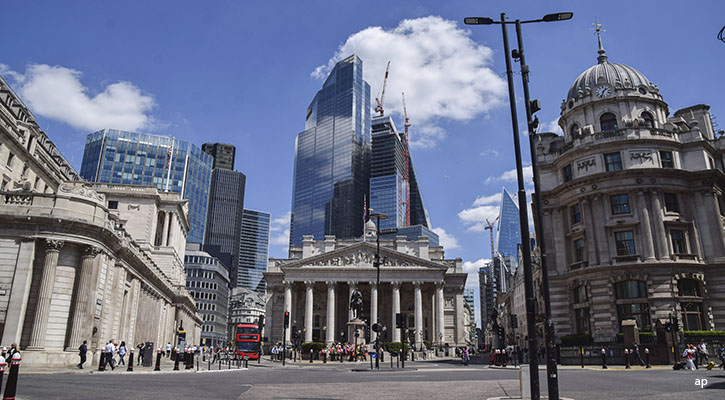
Financial markets shifted gear on Wednesday after UK inflation figures for May came in lower than expected. It may be too early to describe a drop in CPI from 8.7% to 7.9% as a decisive turning point in the UK’s battle against persistent inflation, but the data at least backs the idea that trend is finally moving in the right direction.
This pushed the FTSE 100 higher, helped by gains in interest-rate sensitive stocks, while the pound fell after its recent rally against the dollar. After a strong run for gilt yields this year, two- and 10-year gilt yields softened as bond markets recalibrated expectations for the Bank of England’s “terminal” interest rate, which effectively suggests a lower peak for rates following a big push higher this year.
Lower petrol prices were the main driver in the drop in inflation to 7.9%, the Office for National Statistics (ONS) said, while rises in food prices are moderating after some painful rises in staples for shoppers.
Core inflation, which strips out food, energy and alcohol, dropped to 6.9%, having hit a 30-year high in May. CPI has been above 10% for some of this year, increasing pressure on consumers and pushing some workers to ask for double-digit pay rises. The table below shows how inflationary pressures have built up since 2021 in various categories.
Are Rate Rises Now Working?
Where does this leave the Bank of England? July sees the Bank skip a month so the next meeting will be on 3 August. Having jolted mortgage holders and bond markets with a 50 basis poing rise in June, the monetary policy committee is now unlikely to repeat this next month, experts believe.
Consensus now points to a quarter point rate rise to 5.25%, with the Bank having hiked rates aggressively from their 0.1% record low at the end of 2021. Goldman Sachs Asset Management expects further tightening and the Bank to stop hiking at 5.5%, which implies only 50 basis points of increases from here. Gurpreet Gill, its macro strategist for global fixed income, says the Bank will be encouraged by the softening in core inflation.
The Bank has been on the defensive this year amid accusations it was too slow to see the inflation threat and that repeated rate increases are making borrowers' lives harder in a tough economic environment.
With inflation remaining high and above that displayed by the UK’s international peers, the effectiveness of rate rises has also been called into question. Neil Birrell, chief investment officer and fund manager of the Premier Miton Diversified fund range, Premier Miton Investors, says there isn’t much room for complacency – even after June’s softer data.
“The Bank of England needs to be vigilant and act accordingly until there can be a level of certainty that inflation is back under control,” he says.
Huw Davies, investment manager, fixed income, Jupiter Asset Management, says the Bank of England’s sigh of relief at June figures may be temporary: “We suspect that the UK may exit this inflation phase with a more entrenched inflation problem than when we entered it, a longer-term problem for the UK economy that the BOE will have to take some responsibility for.”
Pay remains a concern for policymakers at Threadneedle Street though, with wage growth around 7%.
For Now...
For now, the Bank still has an inflation target of 2%. It expects this to be reached again in late 2024. CPI is also forecast to drop back to around 5% by the end of 2023, according to the Bank’s May report. If that happens, the government may claim victory in its pledge to halve inflation this year, even if a drop from 10% to 5% still leaves Britons under strain.
But bond yields, which have repeatedly re-priced interest rate expectations, may remain volatile, argues Michael Metcalfe, head of macro strategy, State Street Global Markets.
“It will take more than just one month’s data to calm rate markets,” he said.
Today’s fresh information is unlikely to to ease the short-term pain for mortgage borrowers renegotiating deals this year, with many expected to make much higher monthly repayments.
Two-year gilt yields are still hovering below 5% and many fixed rate mortgages are priced above this. For instance, Nationwide building society’s standard variable rate, which is the default product before people seek better deals, is currently 7.99%.
The author or authors do not own shares in any securities mentioned in this article. Find out about Morningstar's editorial policies.
























